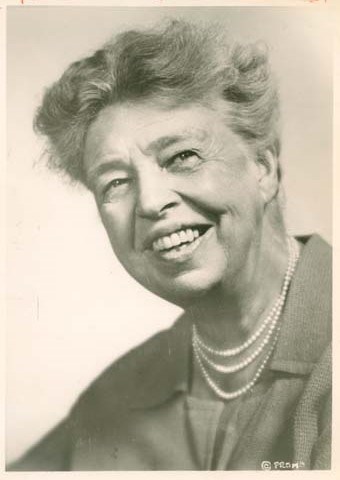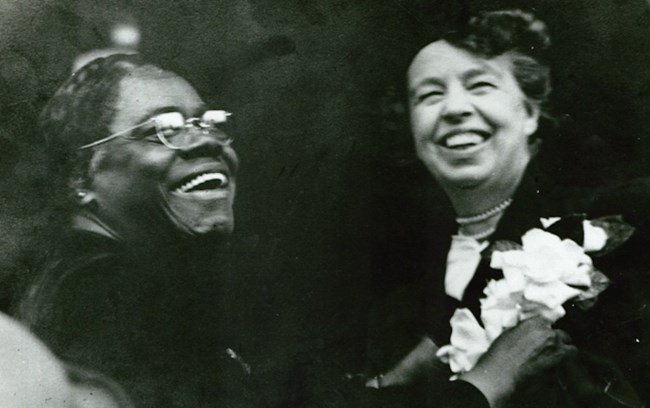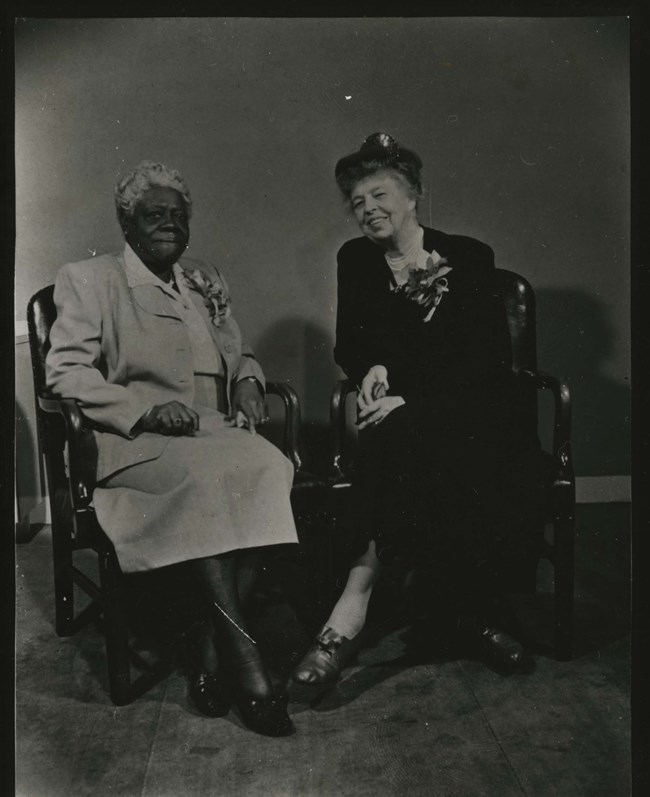
NPS, NABWH An Unlikely AllianceFirst Lady Eleanor Roosevelt was a close, personal friend and ally of Mary McLeod Bethune. While they both came from drastically different backgrounds, the two women bonded over their mutual belief in the power of education and their desire to champion civil and human rights for all people. Early LifeEleanor Roosevelt was born on October 11, 1884, in Manhattan, New York City to the prominent Roosevelt Family, being the niece of Theodore Roosevelt, 26th President of the United States. From 1899 to 1902 she attended Allenswood Academy in London, England. She married her fifth cousin, Franklin D. Roosevelt on March 17, 1905. In 1928, Franklin was elected governor of New York, serving from January 1, 1929 until shortly after his election as the 32nd President of the United States in 1932. The First Lady of the United States and the WorldEleanor served as the First Lady of the United States from 1933 to 1945. As the First Lady, she traveled extensively, both domestically and internationally, representing the United States. She used her diplomatic skills to build relationships with world leaders and promote American values of democracy and human rights. Some of her notable contributions include advocating for civil rights, women's rights, and labor rights. She traveled across the country, visiting communities affected by the Great Depression and reporting back to her husband. She also wrote a newspaper column, hosted a radio show, and actively supported New Deal programs aimed at economic recovery. Her tireless efforts and commitment to social justice made a lasting impact during FDR's presidency. One example of Eleanor's civil rights advocacy was her instrumental role in the fight against racial discrimination. She publicly supported the efforts of African American leaders and organizations, such as the National Association for the Advancement of Colored People (NAACP). She also worked to desegregate the armed forces and fought for equal employment opportunities for African Americans. She was a strong advocate for anti-lynching legislation, pushed for the desegregation of schools, and fought against discriminatory housing practices. 
NPS, NABWH Two Powerhouses UniteEleanor Roosevelt greatly admired Mary McLeod Bethune and her work. The two first met in 1927 when Mrs. Bethune was the serving as the eighth national president of the National Association of Colored Women. At this meeting of the leaders of the country's most influential women’s organizations, Eleanor became appalled when the all-white attendees refused to sit with Mrs. Bethune, the sole African American guest. They forged a fast bond and Eleanor recommended Mrs. Bethune to her husband to serve as an advisor to the National Youth Administration (NYA), a New Deal agency aimed to provide employment and educational opportunities for young people during the Great Depression in June of 1935. The following year, Mrs. Bethune was appointed the agency's Director of the Division of Negro Affairs, becoming the first African American woman to hold such a position in the federal government. Eleanor's support of Mrs. Bethune did not stop there. Several months later, Mrs. Bethune brought together 29 representatives from various Black women's organizations to create one "organization of organizations" called the National Council of Negro Women, Inc. (NCNW). Eleanor was a champion of the organization and its initiatives, becoming a life-member, serving as guest and keynote speaker at numerous NCNW events, helping to fundraise, bringing awareness, and making public appearances. Mrs. Bethune leveraged her access and proximity to Eleanor to bring racial discrimination issues directly to President Roosevelt’s attention and he in-turn held her in very high regard. At Mrs. Bethune’s invitation, the First Lady spoke at the National Conference on the Problems of the Negro and Negro Youth that Mrs. Bethune and other Black Cabinet members organized in 1937 and again in 1939, and in 1938, the two friends co-hosted the major White House Conference on Governmental Cooperation in the Approach to the Problems of Negro Women and Children that was sponsored by the NCNW. Later YearsAfter her husband's presidency, Eleanor Roosevelt continued to be an influential figure. She focused on human rights and became a delegate to the United Nations, serving from 1945 to 1953. In fact, she made sure that Mrs. Bethune, W.E.B. Du Bois, and Walter White were able to serve as consultants as members from the NAACP delegation at the conference that served as the formation of the United Nations held in San Francisco, California in June 1945. Both women successfully lobbied for the creation of the landmark charter dedicated to human rights. Looking back on the conference, Mrs. Bethune wrote: "The masses of the peoples of the world are demanding a major role in the shaping of the new civilization which began to dawn in San Francisco. . . It is my fervent hope, it is my earnest prayer, that America wil not fail in her role as a major world power to give now, in this new day of world brotherhood, equal economic, social, political, freedom to all her citizens regardless of race, color, or religion. For only then shall we have real peace, permanent peace here in America, and a claim to the righteousness that exalteth a Nation." When Mrs. Bethune died on May 18, 1955, Eleanor dedicated an issue of her popular syndicated column, “My Day,” to the remarkable life of her dear friend, vowing to “cherish the spirit she lived by and try to promote the causes she believed in, in loving memory of a very wonderful life.” Eleanor Roosevelt died on November 7, 1962. Her dedication and influence extended far beyond her husband's presidency, leaving a lasting impact on the world. 
NPS, NABWH More ResourcesInterested in learning more about Mary McLeod Bethune and Eleanor Roosevelt, the two of the greatest figures of the twentieth century? Check the links out below! 1949 Radio Broadcast of Eleanor Roosevelt and Mary McLeod Bethune in support of interracial support and the National Council of Negro Women Black Americans, Civil Rights, and the Roosevelts, 1932-1962 - Special Exhibition at the Franklin D. Roosevelt Presidential Library and Museum Eleanor and Mary McLeod Bethune - PBS It's Up to the Women: Eleanor Roosevelt, Women's Politics, and Human Rights |
Last updated: April 13, 2024
